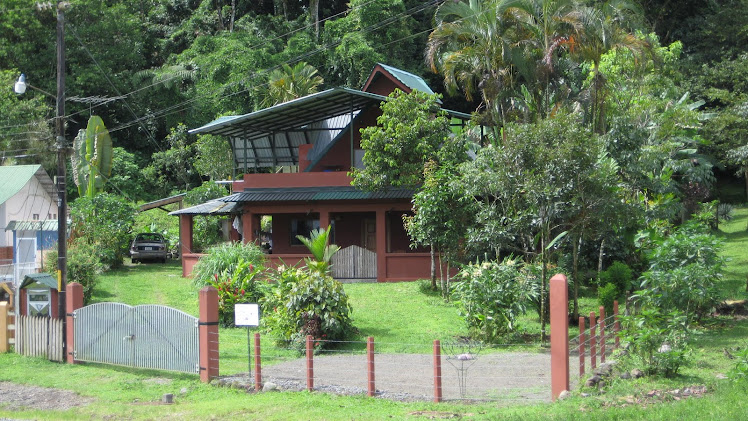
Michael Copeland founded Rock Costa Rica after falling in love with the Lake Arenal area and moving there from Northern California’s Bay Area. He developed a deep affection and respect for the Tico people and for the Costa Rican philosophy of pura vida (“the pure life”) – a philosophy characterized by strong community spirit, perseverance, resilience in overcoming difficulties, enjoying life slowly and celebrating good fortune.
Monday, February 21, 2011
Costa Rica Has Become Unaffordable For Many Expats
By John R. Holtz
Again the dollar has hit sub-bottom measured against a very limited global currency, the Costa Rica colon, resulting in business losses, government losses and excessive costs of living on all but the basics.
An interesting comparison in perspective is Guatemala which similar to Costa Rica, very much depends on a dual currency system between the Quetzal and USD.
Contrary to Costa Rica, Guatemalan economic headlines call for the critical need to readjust the exchange rate since the Quetzal appreciated 2.1% against the USD resulting in a slowdown in exports and increased inflation.
Those are two things that the government is not willing to tolerate.
Meanwhile, here in paradise, with the same scenario and with a far more extensive depreciation of the USD causing far greater economic harm, we seem to drift along on the high seas without a defined direction and daily become less and less competitive while more and more expensive.
The ARESEP, the official Costa Rican price fixer, has approved the second raise of the year in gas prices because oil is touching on us$87 a barrel (not colones per barrel) and the dollar, the only accepted currency to OPEC, has been devalued here resulting in a need to increase wholesale and pump prices. What we have is a two headed snake.
In turn, this inflates transport prices which obviously impact the costs of goods and services in Costa Rica, right down to you and me.
Imagine; even while having this amazing windfall profit of an artificially strong national currency, importers are claiming the need to raise prices because of increased costs of transportation.
Why is inflation in Costa Rica within limits and a reported a mere 5.8% in 2010?
Because the government counts what it wants to count and almost never considers water, electricity, imported finished foodstuff, gasoline, prescription drugs, etc.
The Central Bank model is designed to support the forecast and does not quite reflect reality. In truth, during the last four months our Consumer Price Index (CPI), when annualized, comes to about 7.65% inflation and growing towards a 2011 finality of 8% to 10% if change is not imminent.
We all know the downside but the real question is what can we do about it?
Certainly the foremost and definitive option is move out and take your money with you. All of it! Don’t leave a dime behind.
Then there is stay, but stash your money outside CR, especially when people are talking taxes which I see coming in one form or another.
Of course, another good option to consider is to downsize and spend less!
But then again, most expats came here to downsize and spend less but are having to spend more to live comfortably.
Also there is the possibility to start some sort of non-profit organization that hosts tours to Panama in order to purchase medicines, household goods, even food products at 40% to 70% cheaper prices than Costa Rica.
And why not? I like that option!
“Yeah”, it is haul to Panama, but I have found from people I know that it seems worth the trip. Maybe we can get surrogate “buyers” on our behalf and cheat the cheaters?
Or, for some, heading south of the boarder it is a one way trip.
Panama is not all that crime free as most expect. It is a corrupt country but it has its values as well.
What Panama is not is the woeful never ending bureaucracy that Costa Rica fosters. That does not make it bureaucracy free, just less woeful.
Fixed income people on USDs are saying, over and over again, that Panama is a better deal all around.
Costa Rica has become unaffordable to the average expatriate.
People, including many Costa Ricans, moving from here to Panama are doing so mainly for two reasons.
First, after adding up the tab, the cost of living in Panama is considerably less expensive than Costa Rica, especially if their senior discounts are factored in, which CR also has, but not nearly to the same extent.
Duty free import of cars every two years, furniture/appliances also come in duty free, and a 20 year exemption on real estate taxeseach contribute to a significant economic difference. This is how Costa Rica was, but is not today. Then we got rich and dumped the welcome mat.
Secondly, and perhaps even more important, expatriates indicate that they feel more “welcomed” in Panama where in Costa Rica they feel only tolerated as well as alienated from the government.
There is nothing worse than the feeling of alienation!
But do not jump from country “A” to country “B” based on Internet info! Costa Rica still has a lot to offer. While I do not agree that we are “the happiest country” on earth, somehow, when it is the bleakest of times, Costa Rica becomes one of the luckiest countries on the planet.
We have certainly a robust technology sector, excellent theatre, lots of well paying jobs, a solid cultural community, excellenteducation and scientific research that is first world. All of this has a social value worth paying for.
But then again, how much is it worth?
*John Holtz can be reached at jrh@modernmanagement.org
Subscribe to:
Post Comments (Atom)
No comments:
Post a Comment